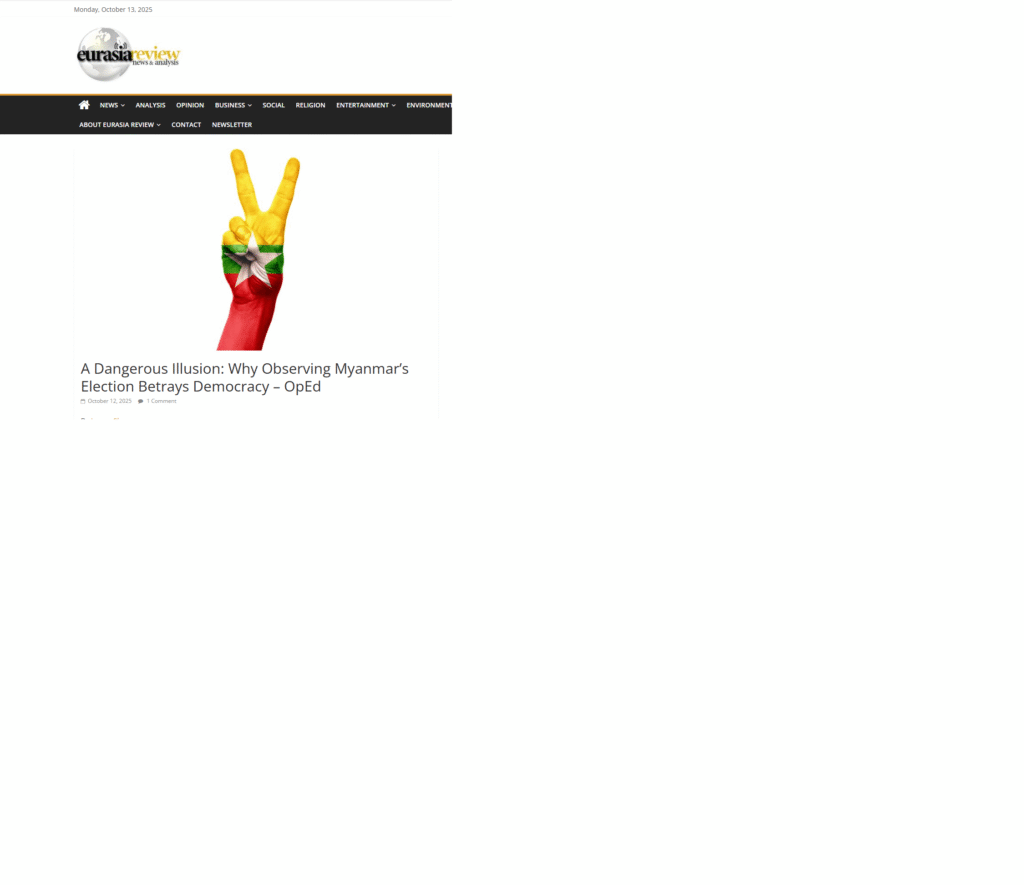By James Shwe

I was recently asked by a citizen of a Western democracy a question that, while well-intentioned, reveals a dangerous misunderstanding about authoritarian regimes. Seeing that Myanmar’s military junta was planning an election, they asked: “Why is it a bad thing to go observe? Surely, if a military junta holds an election, they have intentions to free up the country.”
This perspective, which sees a ballot box as an inherent sign of progress, is precisely the narrative the violent and illegal military regime wants the world to believe. But we must not be fooled. The junta’s elections, set to begin on December 28, 2025, are not a step towards democracy. They are a meticulously crafted trap, a cynical performance designed to manufacture legitimacy for an illegal, violent, and authoritarian rule. Engaging with this sham, especially by sending international observers, is not a harmless act; it is an act of complicity that betrays the millions of people in Myanmar who continue to risk their lives for genuine freedom.
The junta’s primary motive is survival, not liberation. After seizing power in a violent coup in February 2021 and facing nearly five years of fierce nationwide resistance, General Min Aung Hlaing’s regime is internationally isolated and losing ground on the battlefield. The elections are a desperate attempt to break this isolation. The goal is to rebrand the junta as a legitimate government, secure international recognition, and normalize its brutal grip on power under the thinnest veneer of a democratic process.
To understand why this election is a fraud, one must look past the superficial promise of voting and see the reality on the ground.
A Foundation of Illegality and Repression
First, the junta has no legal authority to hold elections. The legitimate mandate rests with the parliamentarians chosen in the 2020 general election, a vote that credible international observers confirmed was free and fair. The military’s pretext for the coup—baseless allegations of widespread voter fraud—was a lie used to justify their illegal power grab.
Second, the conditions for a genuine election have been systematically destroyed. The National League for Democracy (NLD), which won the 2020 election in a landslide, has been forcibly dissolved. Its leaders, including Nobel laureate Aung San Suu Kyi, are imprisoned along with over 20,000 other political prisoners. The junta has engineered a new legal framework designed to eliminate all opposition, requiring parties to meet impossible registration criteria while reserving 25% of parliamentary seats for the military outright.
Discover more
Global News Journal
Defense Technology Sector Analysis
East Asia News
Arms Export Data Service
World News Newsletter
Environmental Policy Briefings
Political Risk Insurance
Regional Expertise Consulting
Third, this is an election held at gunpoint. The junta has declared martial law in 63 townships, many of which are opposition strongholds. The country is an active war zone where the military continues to commit atrocities, including aerial bombardments of civilians and the torture of detainees. A new law threatens anyone who “disrupts” the election—a term so broad it includes critical speech—with harsh penalties, including execution. In this environment of terror, there is no freedom from fear, a prerequisite for any credible election.[5][1]
A Chorus of Global Rejection
The world’s leading democratic and electoral watchdogs have unequivocally condemned this process. The Asian Network for Free Elections (ANFREL) and International IDEA concluded the junta’s process “cannot be considered credible or legitimate” and fails to meet international standards.
This call for rejection has been echoed by a global coalition. While specific governments continue to finalize their official positions, numerous democratic nations, global trade union federations representing over 200 million workers, and more than 200 civil society organizations from Myanmar and around the world have already denounced the polls as a sham. These groups have urged all UN member states to categorically reject the election and refuse to provide any form of technical or material assistance, including election observation.
The Observer’s Trap: The Impact and Risk
Sending international monitors is not a neutral act of fact-finding; it is a political act that plays directly into the junta’s hands. Their presence, no matter how critical their final report might be, lends the process an undeserved veneer of legitimacy. The junta craves the photo opportunities and the headlines suggesting the world is watching, as it helps them sell their narrative of a “transition” to partners in ASEAN and beyond. UN Special Rapporteur Tom Andrews has rightly called the planned polls a “mirage” and a “fraud,” emphasizing you cannot hold an election while imprisoning and executing your opponents.
The stakes are life and death. The junta’s push to secure territory to hold these sham elections will only intensify the violence, putting civilians in even greater danger. As ANFREL starkly warned, people are being killed and will continue to die because of these elections.
The international community faces a clear choice. It can choose to engage with this dangerous illusion, lending credibility to a process designed to entrench a murderous regime. or it can stand in solidarity with the people of Myanmar and the global consensus for democracy.
The correct path is clear: unequivocally reject these sham elections. Refuse to send observers. Refuse to recognize the results. Instead, intensify pressure on the junta and provide robust support to Myanmar’s legitimate democratic forces. To do anything less is to become an unwitting accomplice in the junta’s cynical scheme to extinguish the flame of democracy in Myanmar for good.
James Shwe
James Shwe is a Burmese American Engineer residing in Los Angeles, California, USA. He was born in Yangon, Myanmar in 1954 and has been residing in the US since 1984. He is a Registered Professional Mechanical Engineer in California. He owns and operates a consulting engineering firm in Los Angeles.



